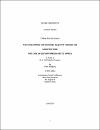THE ARAB SPRING AND CHANGES IN QATAR FOREIGN AID ARCHITECTURE: THE CASE OF QATAR FOREIGN AID TO AFRICA
Abstract
It is uneasy to lose sight of the critical role foreign aid plays in Qatar's engagement with the wider world. Since 1995, Qatar has occupied an enviable reputation as emerging donor in the Middle East region. It relations with Africa is sophistically managed through foreign aid. However, big changes are already afoot in the Middle East in general. The outbreak of the Arab Spring has forced countries like Qatar to remodel their foreign policies through the use of foreign aid in a quest to optimize their gains from this turbulent political environment. To this end, this thesis examines changes in Qatar foreign aid in the span of four years, 2010 to 2013. Specifically it investigates the extent to which the eruption of the Arab Spring in 2011 has shaped Qatar foreign aid and the reflection of this on the flow of Qatar external aid to Africa. Through a thorough analysis of Qatar Foreign Aid Reports of 2010, 2011, 2012 and 2013, it is found that changes in the overall architecture of Qatar foreign aid- in terms of volume and the recipient countries- are determined by the Arab Spring. Nevertheless, the extent to which the Arab Spring has remodeled Qatar foreign aid to Africa is generally imprecise and sketchy. The volume and the recipient of Qatar development assistance to Africa remained stable and consistent in the last past five years, and the insignificant changes in the recipients of Qatar foreign aid to Africa is connected to factors associated with political and economic developments in different African countries. The stability in Qatar foreign aid flow to Africa, despite the dynamic of Qatar foreign policy, discloses that Africa occupies footnote position in Qatar foreign policy priorities; and it also reveals that Qatar could not realize the importance of the Africa in the context of its struggle to optimize its gain from the Arab Spring. As Qatar lacks alternative and meaningful foreign policy to engage with Africa than foreign aid, it should relax its dependence on its NGOs to carry out this task. This should allow Qatar to strategically us its aid to Africa in a quest to advance its national interests in the continent.
DOI/handle
http://hdl.handle.net/10576/3889Collections
- Gulf Studies [77 items ]


